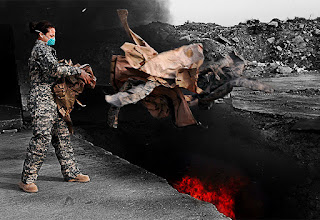Over 133,000 Veterans Who Got Military Disability Are
Due Tax Refunds
 According
to an article on Military.com last month, the Department Of Defense started
sending notifications to more than 133,000 veterans who may qualify for a
refund of federal taxes paid on disability severance pay dating back to January
17, 1991.
According
to an article on Military.com last month, the Department Of Defense started
sending notifications to more than 133,000 veterans who may qualify for a
refund of federal taxes paid on disability severance pay dating back to January
17, 1991.
Under
federal law, veterans who suffer combat-related injuries and who are separated
from the military are not supposed to be taxed on the one-time lump sum
disability severance payment they got from the military.
For
years DOD improperly withheld taxes on these payments from thousands of
unsuspecting veterans, who were typically unaware that their benefits were
being improperly reduced.
In
2016 Congress passed the Combat-Injured Veterans Tax Fairness Act which
directed DOD to identify veterans who have been separated from service for
combat-related injuries and had taxes improperly withheld from their severance
payments.
The
law also required DOD to determine how much these veterans are owed so they can
recover the withheld amounts, notify them of their eligibility for a refund,
and tell them how to get that refund from the IRS.
Eligible
veterans will have a year after they receive the notice from DOD to file a
claim for the refund.
Court Determines Military Burn Pits Caused Lung
Disease in Troops
A
number of veterans who served in Iraq and Afghanistan, told me about burn pits
that dot the landscape and are used to destroy all sorts of items. One veteran
ascribed a burn pit as a Dante’s Inferno. “You name it and it has been thrown
into a pit.” the veteran said. “Desks, chairs, ammunition cases, used oil,
plastic barrels. I even saw a truck rolled into the pit.” Jet fuel is often
used to ignite the pit. If you are not familiar with burn pits, there are a
number of videos posted on You Tube that are very informative.
Thousands
of U.S. military personnel and private contractors whose health was compromised
by the dense black smoke of burn pits -- and who were then denied proper
treatment -- may finally be vindicated by a recent court ruling.
A
judge under the U.S. Department of Labor's Office for Workers' Compensation
Programs decreed last month that open-air burn pits -- where thousands of
chemicals were released into the air after trash and other waste were
incinerated at American military bases in Iraq and Afghanistan -- are connected
to lung disease.
The decision marks a victory for
the nearly 64,000 active service members and retirees who have put their names
on a Burn Pit Registry created by the Veterans administration
(veteran.mobilehealth.va.gov/AHBurnPitRegistry/#page/home), bringing them one
step closer to getting adequate medical coverage, something that has never been
guaranteed. Private contractors who were also exposed to the burn pit toxins
also have been denied coverage.
"This
case has legitimized the disease," former contractor Veronica Landry of
Colorado Springs, whose case was a part of the recent ruling, told Fox News.
"There are many people out there who are still not getting the treatment
they need.”
Soldiers
have fallen gravely ill or even died from exposure to burn pits in Afghanistan
and Iraq, but they are not the only ones who have gotten sick. Civilian workers
and private contractors like Landry are also suffering an array of maladies
including cancer, respiratory problems and blood disorders and, like military
victims, they say they are being ignored.
But
private employees don't even have the Veterans Administration to lean on.
Landry filed her case with the Labor Department for this very reason.
Landry
said in her testimony that she was exposed to smoke from the burn pits
"every day" while working at Mosul Air Force Base in Iraq for
Kellogg, Brown, and Root [KBG], and that "every plastic water bottle that
every soldier drank out of was also burned in the burn pits."
Landry
was sent home early after developing PTSD and making matters worse, she started
to develop problems with her lungs and other ailments such as migraines, chills
and dangerously low blood pressure. She has been in out of hospitals for nearly
ten years.

No comments:
Post a Comment